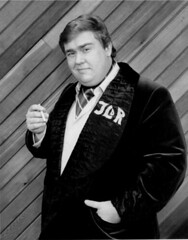 I squandered a good deal of my childhood listening to the vocal stylings of Allan Sherman, a Borscht Belt singer whose schtick entailed silly parodies of familar tunes, including "Hello Muddah, Hello Fadduh," otherwise known as "Camp Grenada" ("Hello muddah/hello fadduh/here I am at/Camp Grenada...").
I squandered a good deal of my childhood listening to the vocal stylings of Allan Sherman, a Borscht Belt singer whose schtick entailed silly parodies of familar tunes, including "Hello Muddah, Hello Fadduh," otherwise known as "Camp Grenada" ("Hello muddah/hello fadduh/here I am at/Camp Grenada...").
Most of my friends enjoyed Allan Sherman's company as well, but not one, a kid named Marlon who lived down the block. At nine, a year older than me, Marlon was the alpha male of the neighborhood group, and he seemed to take pleasure in trying to humiliate me.
One summer afternoon as five or six of us were playing in Marlon's front yard, he decided to hold court on my tastes in art and music. He thought that the fact I liked "Snoopy, Come Home" was stupid, for instance.
He had particular scorn towards my tastes in records. "[Bookfraud] listens to stupid music, like Alan Sherman," he said, positively spitting out the words.
It was humiliating, I'll give him that. Fortunately, Marlon didn't know when to stop.
"Allan Sherman's stupid," Marlon said. "[Bookfraud] doesn't like good songs, like 'The Candyman.'"
The Candyman. The mere mention of that title brings Sammy Davis Jr.'s voice into my head: "The candyman can 'cause he mixes it with love and makes the world taste good…” The song might as well be a paean to child movie stars' drug dealers.
"The Candyman" is a punch line without a joke, while "Hello Muddah, Hello Fadduh" is widely acknowledged as a classic.
I was right; Marlon was wrong. Revenge is mine!
Looking back, the realm of treble and bass clef stands as one of the few things from my childhood and adolescence that doesn't embarrass me. High school, when one's allegiance to Band A or Band B defined your persona, was a time of particular pride: I hated REO, but loved the Ramones; I hated Rush but loved Devo; I despised Journey but loved the Clash. For these very things I was mocked, forced to wear a crown of thorns!
Years later, in looking at the Big Playlist of Life, I can say that my music was great; theirs sucked. Revenge is mine!
We must repeat
Marlon, The Candyman, and Devo don't have much to say about the literary life, per se, but it's come to me lately how much resentment and the need for revenge motivate people to create art.
As I've noted before and will probably note again as the idea-factory known as my brain reaches its natural limit, fiction writers usually do not start their quixotic journeys from a shiny, happy place in their hearts. Those who do simply are setting us up to have our hearts broken.
Do you want to read about the happiest childhood ever with completely functional parents, a story about how great it is to be rich, and why this narrator wallows in bliss, all delivered without a shred of irony or perspective? Perhaps you do, which probably explains why you are drawn to my painfully earnest prose.
Viewed from the surface, Marlon doesn't display much in the way of inner turmoil, except as perhaps a bully; he's a fine caricature. Marlon could write a book featuring characters who are always right.
Or take those who dominated the hierarchy of high school — jock kings and cheerleader queens. Can you think of one good novel, story, or movie that looks at them in anything but an unsympathetic light? It's because the people writing those books about high school were the outcasts, losers, stoners, and sensitive folk nobody wanted to emulate.
They were the people who were listening to the DKs and the Sex Pistols; they were the people sitting in the corner, smirking, suffering, being ignored, and counting the days until they could escape the hell known as adolescence. If they were lucky, they could play a mean guitar and grab some girls.
The sense of alienation motivated many of us to write, usually terifficaly pretentious poetry that we'd rather eat than have to read aloud. But for someone who wants revenge, I always get the picture of an angry nerd saying “I’ll show them. Everybody who makes fun of me is going to regret it,” and, as a result of such anger, starts Microsoft or arrives at school with an AK-47.
(I often wonder if it's still the same -- in suburbia, I imagine that the jocks and cheerleaders still rule the roost, but "alt culture" has become mainstream enough that the mohawked punk -- or even the computer nerd or gay teen -- may not be a de facto outcast).
Best served cold
It’s a nice feeling, being vindicated. But ultimately pointless.
Feeling superior for things I loved 20 or 30 years ago is empty solace, proving absolutely nothing. I also greatly exaggerate the sense of separation I had from my classmates; it makes me feel superior, which is a feeling I’d just as rather not indulge. Those who are motivated to take revenge on the unpleasant memories of being 16 probably are best served by something called therapy.
But damn, did I hate those years. If someone says high school was the happiest time of his life, punch him in the nose. I'll pay your legal bills.
Thursday, April 13, 2006
Revenge Is Mine
Subscribe to:
Comment Feed (RSS)


|